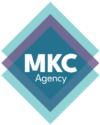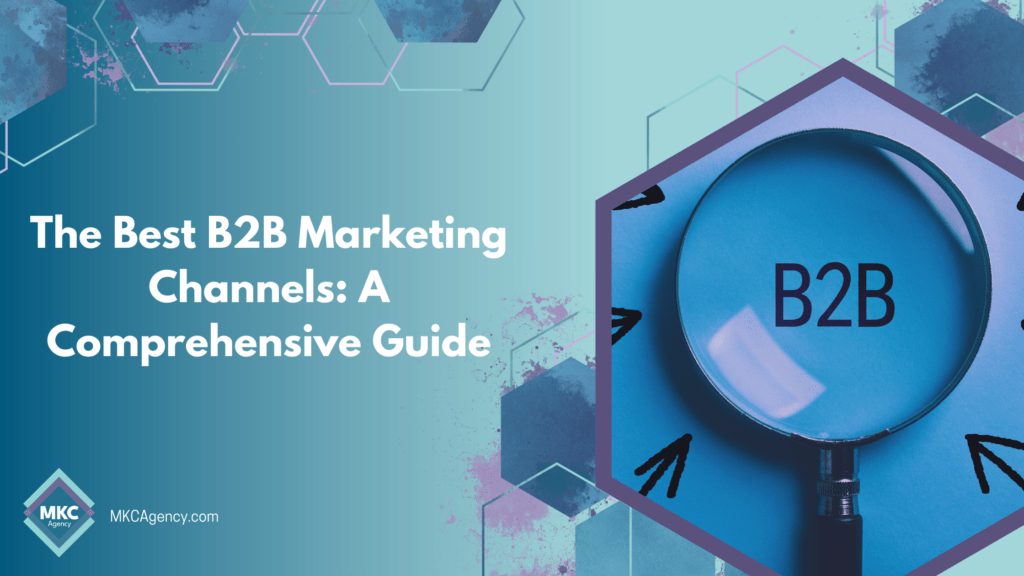As a B2B marketing agency, we know that choosing the right marketing channels is crucial to drive leads and revenue for our clients. But with so many options available, it can be overwhelming to decide where to invest your marketing budget. In this blog, we’ll share our insights on the best B2B marketing channels that deliver the most impact and ROI.
Email marketing
Despite its age, email marketing still reigns as one of the most effective B2B marketing channels, boasting a median ROI of 122%. With personalized and segmented emails, businesses can nurture leads and convert them into paying customers.
Email marketing is an essential part of any B2B marketing strategy, and getting prospects to give you their email addresses is key. One way to do this is by offering something of value in exchange for their email address, such as a whitepaper, ebook, one-pager or industry report. Be sure to create landing pages specifically for these offers, with a clear call-to-action and a form that captures the user’s contact information.
Once you have their email address, it’s important to send relevant emails that provide value and build trust. This means sending personalized emails to targeted segments of your email list that speak directly to their pain points and interests. For example, if you’re targeting IT decision-makers, you might send emails about new technology trends, best practices for cybersecurity, or case studies from companies similar to theirs.
It’s also important to be consistent with your email cadence and to avoid bombarding your subscribers with too many emails. Finding the right balance will depend on your specific audience and industry, so it’s important to experiment and see what works best.
Another way to build trust through email marketing is to incorporate social proof, such as customer testimonials, case studies or industry awards, into your email content. This can help reinforce your expertise and credibility in the eyes of your prospects.
Overall, email marketing is a powerful tool for B2B lead generation and nurturing, but it requires careful planning and execution to be effective. By offering valuable content, personalizing your messaging, and incorporating social proof, you can build trust with your prospects and turn them into loyal customers.
Referral campaigns and review campaigns can be powerful tools for building trust and credibility in the B2B space.
Referral campaigns can be an effective way to leverage your existing customer base to attract new leads. When a current customer refers a colleague or friend to your business, that new lead already comes with a level of trust in your company because it comes from a trusted source. You can encourage referrals by offering incentives or rewards for successful referrals.
In terms of review campaigns, platforms like G2 and Trustpilot can be invaluable for showcasing positive customer experiences and building credibility. Encourage satisfied customers to leave reviews on these platforms, and make sure to respond to any negative reviews in a professional and helpful manner. Potential customers will often research companies on these platforms before making a purchasing decision, so having a strong presence can be a big differentiator.
By focusing on building trust through referrals and reviews, you can establish your business as a reliable and trustworthy partner in the eyes of potential B2B customers.
Search Engine Optimization (SEO)
SEO is an essential channel to drive organic traffic to your website, increase brand visibility, and generate leads. By optimizing your website for relevant keywords and producing high-quality content, you can attract potential buyers at the top of the funnel.
SEO is a powerful way to attract high-quality traffic to your website, and building a strong SEO strategy requires a deep understanding of what your ideal customer is searching for online. Fortunately, there are tools available that can help you gain this understanding and create content that resonates with your target audience.
AnswerThePublic is a free tool that allows you to enter a keyword related to your business and see the questions people are asking related to that keyword. This information is invaluable because it tells you exactly what your target audience is looking for and helps you create content that directly answers their questions.
SEMrush is another tool that can help you build an SEO strategy that attracts your ideal customer. With SEMrush, you can see what keywords your competitors are ranking for, which pages on their website are getting the most traffic, and much more. This information can be used to guide your own content creation and ensure that you’re targeting the right keywords and topics.
By using tools like AnswerThePublic and SEMrush to build your SEO strategy, you can create content that speaks directly to your target audience and positions your business as an expert in your industry. This can help attract high-quality traffic to your website, generate leads, and ultimately drive revenue for your business.
Social Media and Online Communities
Social media platforms like LinkedIn, Twitter, and Facebook are powerful tools for B2B marketing. By sharing valuable content, engaging with your audience, and building relationships, you can increase brand awareness and drive traffic to your website.
When it comes to social media channels for B2B marketing, LinkedIn is the clear winner. It’s a platform specifically designed for professionals and businesses, making it an ideal place to connect with potential clients and customers.
However, there are other social media channels that can be effective for B2B marketing as well, depending on your industry and target audience. Twitter can be useful for engaging with industry influencers and sharing quick updates, while Facebook can be a good option for businesses targeting other businesses in specific industries or niches.
In addition to the traditional social media channels, there are some newer B2B channels that are gaining popularity. One of these is Bravado, a professional networking community for sales professionals. Bravado provides a platform for salespeople to connect, learn, and share best practices, making it a valuable resource for B2B companies looking to improve their sales strategies.
Another platform to consider is Pavilion, a community for executives and decision-makers. Pavilion offers a space for executives to connect with each other, share knowledge, and learn from industry experts. This platform can be especially valuable for B2B companies looking to build relationships with potential clients or partners at the executive level.
If you’re marketing to MSPs, you may want to consider checking out industry-specific communities like MSPAlliance, ConnectWise’s Community, or MSP owner groups on LinkedIn. These communities offer a wealth of knowledge and insight into the challenges and opportunities facing MSPs today.
Similarly, those targeting CDNs may find value in joining the CDNAlliance, which provides access to industry experts and thought leaders, as well as networking opportunities with other professionals in the CDN space. By tapping into these niche communities, B2B marketers can gain a deeper understanding of their target audience and more effectively engage with potential customers.
It’s important to remember that not all social media channels or B2B communities will be relevant or effective for every B2B company. It’s important to understand your target audience and where they spend their time online before investing resources in a particular channel or platform.
Pay-Per-Click (PPC) and Content Marketing
PPC advertising enables businesses to place targeted ads on search engines and social media platforms. With the right targeting and messaging, PPC can help businesses drive leads and conversions.
Content marketing is all about providing valuable and relevant content to attract and retain a clearly defined audience. By creating and distributing content through various channels, businesses can build trust and authority, ultimately driving leads and revenue.
When it comes to driving traffic and generating leads, pay-per-click (PPC) ads and content marketing are two powerful tools that can work hand-in-hand. PPC ads allow you to reach your target audience through specific targeting options such as location, interests, and demographics. By properly targeting your PPC ads, you can drive traffic to high-value content marketing landing pages where you can provide answers to the questions your targeted buyer personas might have.
The key is to create content that is valuable and relevant to your target audience. Think about what problems your ideal customer might be trying to solve for and position yourself as the expert by creating and distributing relevant content that answers those questions. This could be in the form of blog posts, ebooks, whitepapers, webinars, or even interactive content like quizzes or calculators.
When crafting your PPC ad and content marketing strategy, be sure to keep your target audience in mind. What are their pain points? What information do they need to make informed decisions? By providing them with the information they need and positioning yourself as a trusted authority, you can generate high-quality leads that are more likely to convert into paying customers.
And don’t forget to track your results! By analyzing your PPC and content marketing metrics, you can see what’s working and what’s not and make adjustments to optimize your campaigns. With the right targeting and content, PPC and content marketing can be a winning combination for driving traffic, generating leads, and growing your business.
Choosing the best B2B marketing channels depends on various factors, such as your business goals, target audience, and budget. By focusing on the channels that align with your business objectives and delivering high-quality content and experiences, you can generate leads and revenue. Want to learn more about B2B marketing? Check out our other blogs!
Contact us to learn how we can help you leverage these channels to drive results.

